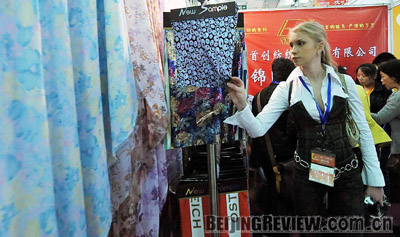|
|

|
|
HARD TIMES: China's textile exporters used to have solid profit margins in foreign markets, but higher costs for labor and materials at home and a stronger yuan have dampened their financial prospects |
The government's latest round of tax rebate increases for some types of textile and garment products may soothe the frazzled nerves of the country's beleaguered textile exporters.
The export tax rebates for silk, wool yarn, chemical fiber and cotton products were increased by 2 percentage points to 13 percent on August 1, according to the State Administration of Taxation.
Since 2007, the country's textile sector has been caught in a tight spot with scores of enterprises running deficits. The first half of this year saw more than 10,000 textile manufacturers go bust, while the average margins of others fell to a dismal 0.62 percent, according to data from the National Development and Reform Commission.
Manufacturers located in some of China's traditional textile hotbeds have been losing heart. A report issued by the China National Textile and Apparel Council (CNTAC) said 60 of the 600 textile manufacturers in Jiangyin in east coastal Jiangsu Province have shut down. More than 3,000 textile enterprises in Zibo in Shandong Province have lost about 30 percent of their orders to neighboring countries.
Besides this, the country's textile and garment exports during the first half of this year grew a minimum 9.69 percent year on year, 7.28 percentage points lower than the same period last year, according to figures from the National Bureau of Statistics.
Some analysts say the tax rebate hike could lift exporters' profits by about 2 percent, which would cost the government's central finance around 200 billion yuan ($29 billion). Gao Yong, Director of CNTAC, told Beijing Review that the increased tax rebates would be a timely salve for the country's textile enterprises, whose export volume could see a rally this month. But it would not be a permanent solution, he added.
"Major problems that are colluding to ail the industry still loom large, such as the appreciation of the yuan, domestic cost inflation and drooping demands from overseas," Gao said. "The downward trend in the sector will therefore only embrace a cushion, but not a reversal."
No easy remedy
Most textile enterprises have tepidly received news of the tax rebate policy adjustment, according to a report in the Guangzhou-based Yangcheng Evening News. Wang Yongli, Vice General Manager of the Guangdong Silk-Tex Group Co. Ltd., told the newspaper that his company could now receive an additional 0.13 yuan ($0.019) on every $1 worth of exports, but that the amount was still too low to offset its surging costs.
"That would at best count as a short-term respite from losses as concerns over the currency appreciation and sluggish consumption of the United States still linger," Wang said. "The country's textile exports still face dark prospects."
| 